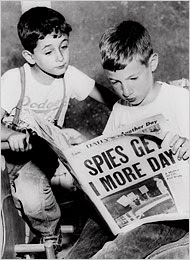Rosenbergs' Sons Accept that Father Was a Spy
 They were the most famous orphans of the cold war, only 6 and 10 years old in 1953 when their parents were executed at Sing Sing for delivering atomic-bomb secrets to the Soviet Union. Then they were whisked from an unwanted limelight to urban anonymity and eventually to suburban obscurity.
They were the most famous orphans of the cold war, only 6 and 10 years old in 1953 when their parents were executed at Sing Sing for delivering atomic-bomb secrets to the Soviet Union. Then they were whisked from an unwanted limelight to urban anonymity and eventually to suburban obscurity.Adopting their foster parents’ surname, they staked their own claim to radical campus politics in the 1960s. Then in 1973, they emerged to reclaim their identities as the sons of Julius and Ethel Rosenberg, determined to vindicate their parents.
Now, confronted with the surprising confession last week of Morton Sobell, Julius Rosenberg’s City College classmate and co-defendant, the brothers have admitted to a painful conclusion: that their father was a spy.
“I don’t have any reason to doubt Morty,” Michael Meeropol said after several conversations with Mr. Sobell over the weekend.
Their conclusions, in separate interviews, amount to a milestone in America’s culture wars and the culmination of the brothers’ own emotional and intellectual odyssey.
More of the NY Times article here.



Comments